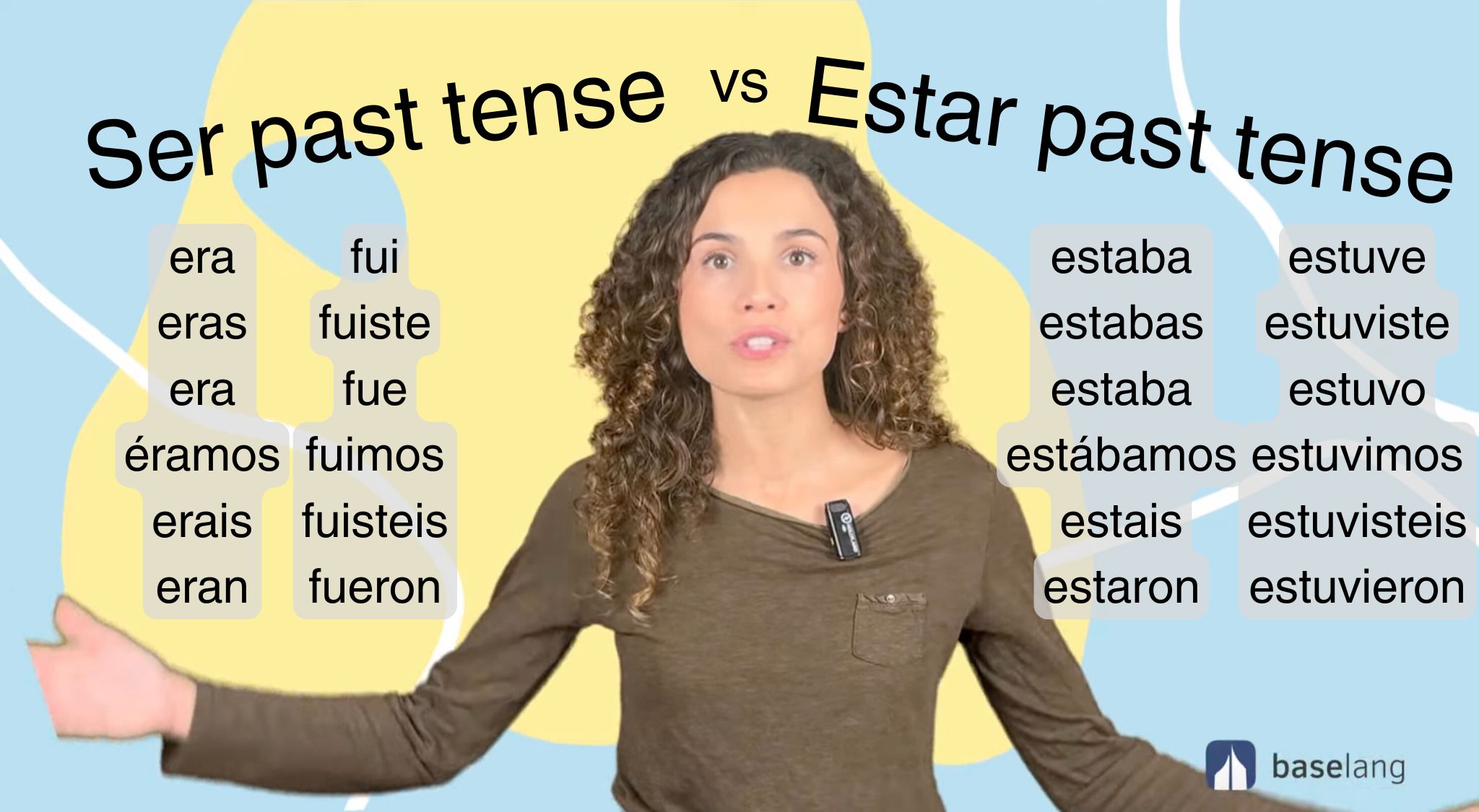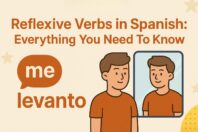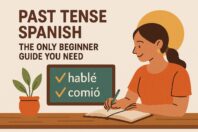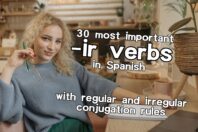Ser and Estar Past Tense: Real-world use of To Be in Imperfect vs Preterite

Get our free email course, Shortcut to Conversational.
Have conversations faster, understand people when they speak fast, and other tested tips to learn faster.
More infoDid you know we have four different words for it was in Spanish? Era, fue, estaba, and estuvo. You probably already know that we have two options for the verb to be in Spanish: ser and estar. Today’s post will focus on using them in the two simple past tenses, imperfect and preterite, so you can always choose the right ser and estar past tense!
We’ll start with a quick review of the main differences between ser and estar, along with a refresher on when to use the imperfect vs preterite tense. We’ll see the conjugations of both ser and estar in these common tenses, alongside the present tense you’re probably already familiar with. Then we’ll be ready to really explore each past tense of ser and estar by looking at the various verb and tense combinations and comparing each one. As always, we’ll provide plenty of examples to demonstrate every concept.
As we do in all of our lessons, we’ll also include plenty of links to our other posts where we go into a lot more detail on many of the concepts we’re covering here.
Now let’s get started with today’s lesson on ser vs estar past tense rules. You should have everything clear by the end of the post, so we’ll finish with a series of practice exercises so you can see how you do.
Ser vs Estar, Imperfect vs Preterite
Before we get into details on the different options for to be in past tense Spanish, let’s review the two forms of to be and the two past tenses.
Ser vs Estar
One of the most fundamental challenges for English speakers is knowing which verb to use in Spanish for to be. If yo soy and yo estoy both mean I am, for instance, what’s the difference?
Ser is our verb for permanent states, used to describe who or what something or someone is. It’s used for details like identity, origin, profession, characteristics, time, possession, and relations. An example is “yo soy canadiense,” meaning “I am Canadian.”
Estar is used to describe temporary states, talking about how or where something or someone is at the time. It’s used for shorter-term things like emotions or location. “Yo estoy cansado” is an example, meaning “I am tired.” We also use estar to build the present progressive, like saying “you are studying” as “tú estás estudiando.”
If all this is new to you, we recommend starting with our dedicated post on ser vs estar. Otherwise we’ll just stick with this little refresher for now, giving more explanations once we reach our sections on ser and estar past tense in action.
Imperfect vs Preterite
Just like ser and estar, preterite and imperfect take some getting used to.
Imperfect is used to describe ongoing or habitual actions in the past. It’s often translated into English with phrases like “she was reading” or “I used to run.”
Preterite is used for completed actions in the past. Its English translations generally use the simple past, like “she read that book last year,” or “I ran in a marathon once.”
We’ll assume you have at least a general understanding of when to use one past tense over the other, so we’ll leave our explanations at that for now. We’ll go into more detail below as we explore to be in past tense Spanish.
If you’re just getting started on past tense Spanish, we recommend our overview post that introduces the five past tenses in Spanish. We also have a full post explaining when to use imperfect vs preterite, as well as detailed posts on each of the two tenses: the Spanish imperfect and the Spanish preterite.
Ser and Estar past tense conjugations
Now let’s learn the past tense conjugations of both verbs. We’ll start with ser and then look at estar. Since you probably know them already, we’ll include the present tense in each of their conjugation tables.
Ser past tense conjugation
Here we see each past tense of ser. Keep in mind that the first- and third-person singular conjugations in the imperfect are the same, so you’ll need to pay attention to a sentence’s context to identify the subject of era.
Note that the preterite of ser is identical to the preterite of ir, which is the Spanish verb meaning to go. Check out our other posts for every ser conjugation and every ir conjugation.
| Ser conjugation | Present | Imperfect | Preterite |
| yo | soy | era | fui |
| tú | eres | eras | fuiste |
| él, ella, usted | es | era | fue |
| nosotros, nosotras | somos | éramos | fuimos |
| vosotros, vosotras | sois | erais | fuisteis |
| ellos, ellas, ustedes | son | eran | fueron |
Estar past tense conjugation
Now take a look at the conjugations for estar in past tense. Like we saw with ser, the imperfect first- and third-person singular conjugations are the same: estaba. See our expanded post for every estar conjugation.
| Estar conjugation | Present | Imperfect | Preterite |
| yo | estoy | estaba | estuve |
| tú | estás | estabas | estuviste |
| él, ella, usted | está | estaba | estuvo |
| nosotros, nosotras | estamos | estábamos | estuvimos |
| vosotros, vosotras | estáis | estais | estuvisteis |
| ellos, ellas, ustedes | están | estaban | estuvieron |
How to use To Be in past tense Spanish
Now we’re ready to see each combination of past tense and Spanish to be verb. We’ll start with ser in imperfect and preterite, and then see the same two past tenses with estar. For each one we’ll include explanations, conjugation tables, and several example sentences. We’ll also include specific comparison sections for each verb and for each tense.
Ser in Imperfect
We use ser in the imperfect tense when describing characteristics, situations, or states that were ongoing or habitual in the past. This past tense of ser is also suitable for introducing background information for setting the scene.
Actions described with ser in the imperfect don’t have a clear beginning or end. When setting the scene, the best translation is usually just was or were. For permanent states in the past that no longer apply, the English translation often includes used to be.
Ser imperfect conjugation
| yo era | nosotros/as éramos |
| tú eras | vosotros/as erais |
| él, ella, usted era | ellos, ellas, ustedes eran |
- Cuando era niño, era muy curioso. – When I was a child, I was very curious.
- Yo era maratonista hasta que tuve un accidente. – I used to be a marathon runner before I had an accident.
- Tú eras un buen estudiante. – You were a good student.
- Alejandro era muy serio. – Alejandro was very serious.
- Mi abuela era una mujer muy amable. – My grandmother was a very kind woman.
- ¿Ustedes eran compañeros en la universidad? – Were you classmates in college?
In each of these examples, the states or characteristics were valid for some undefined duration, but aren’t applicable anymore.
Ser in Preterite
In preterite, ser is mostly used to talk about events or situations that happened in the past and are now over. It’s our go-to verb for summarizing how something went.
Ser preterite conjugation
| yo fui | nosotros/as fuimos |
| tú fuiste | vosotros/as fuisteis |
| él, ella, usted fue | ellos, ellas, ustedes fueron |
- Ese día fue muy bueno. – That day went very well.
- La fiesta fue increíble. – The party was incredible.
- Mi primera clase fue interesante. – My first class was interesting.
Ser Imperfect vs Preterite
Let’s take a moment to really compare the two Spanish tenses with ser.
Ser is used in the imperfect (era, eras, etc.) to describe how things were for a stretch of time in the past, whether describing habitual actions, ongoing states, or just setting the scene with background information. The timing is undefined, with no clear beginning or end. The focus is simply on how things were then, or how they used to be.
Ser is used in the preterite (fue, fuiste, etc.) to summarize an experience or one-time event whose timing had a clear beginning and end. It’s the tense of choice for giving judgment on how something went.
- El cuadro era una obra maestra, pero fue robado el año pasado. – The painting was a masterpiece, but it was stolen last year.
Do you see the difference between era and fue as we use ser in the two past tenses here? Now let’s see a few more example sentences where we compare the use of ser in imperfect vs preterite. Notice how we use era when the time period is vague, and fue when the timing is clear.
- Imperfect: Mi papá era profesor por muchos años. – My dad was a teacher for many years.
- Preterite: Mi papá fue el profesor del curso de verano. – My dad was the teacher for the summer course.
- Imperfect: El concierto era en el parque cada año. – The concert used to be in the park every year.
- Preterite: El concierto fue en el parque el sábado. – The concert was in the park on Saturday.
- Imperfect: Ana era mi amiga de la infancia. – Ana was my childhood friend.
- Preterite: Ana fue mi compañera de cuarto en la universidad. – Ana was my roommate in college.
Estar in Imperfect
Now let’s move on to our past tenses of estar in Spanish, starting with the imperfect.
Like we saw with ser, this tense is for vague stretches of time in the past. With estar, however, we’re describing temporary states like emotions, health, or locations.
Estar imperfect conjugation
| yo estaba | nosotros/as estábamos |
| tú estabas | vosotros/as estais |
| él, ella, usted estaba | ellos, ellas, ustedes estaban |
- Estaba cansado después de trabajar. – I was tired after working.
- Mi abuela siempre estaba feliz de vernos. – My grandma was always happy to see us.
- Los niños estaban en casa todo el día. – The kids were at home all day.
Remember that we also use this past tense of estar to create the past progressive, which is equivalent to saying that something was happening.
- Estaba lloviendo toda la mañana. – It was raining all morning.
- Estábamos comiendo cuando llegó. – We were eating when he arrived.
- Los niños estaban jugando en el jardín. – The children were playing in the garden.
Estar in Preterite
In the preterite, estar is used to describe a location, feeling, or condition that was temporary and had a clear start and end point. It happened then, and now it’s over.
Estar preterite conjugation
| yo estuve | nosotros/as estuvimos |
| tú estuviste | vosotros/as estuvisteis |
| él, ella, usted estuvo | ellos, ellas, ustedes estuvieron |
- Estuve enfermo la semana pasada. – I was sick last week.
- ¿Dónde estuviste ayer? – Where were you yesterday?
- Estuvimos en la playa por dos horas. – We were at the beach for two hours.
Estar Imperfect vs Preterite
Now let’s do a comparison of these two estar past tenses. In either case, we use estar for temporary states like emotions, health, or locations.
We use estar in the imperfect (estaba, estabas, etc) when the timing is vague, like when we give background context or describe ongoing or habitual actions. It’s also used to create the past progressive, which describes ongoing actions as well.
Estar in preterite (estuve, estuviste, etc) is for when the circumstance described by the verb lasted a specific duration of time and has since been completed.
- Mi mamá estaba feliz todo el verano cuando la visitamos, pero estuvo triste cuando nos fuimos. – My mom was happy all summer when we were visiting her, but she was sad when we left.
- Imperfect: El museo estaba cerrado los lunes. – The museum was closed on Mondays.
- Preterite: El museo estuvo cerrado durante el mes de enero. – The museum was closed for the month of January.
What we’ve seen here is the grammatical theory, but the spoken reality is a lot less strict. Native speakers rarely make much of a differentiation between each estar past tense, essentially using them interchangeably. The imperfect is chosen more frequently than the preterite conjugations of estar, so you’re more likely to hear people use estaba, estabas, estábamos, and estaban than their preterite counterparts.
Ser vs Estar in Imperfect
The imperfect is used for ongoing or habitual actions in the past whose duration was vague, so whether we use ser or estar in imperfect just comes down to standard rules of permanent vs temporary states.
- Ser: Mi abuela era de Madrid. – My grandmother was from Madrid.
- Estar: Mi abuela estaba en Madrid. – My grandmother was in Madrid.
- Ser: La fiesta era en el salón principal. – The party was in the main hall.
- Estar: La fiesta estaba animada. – The party was lively.
- Ser: Mi jefe era muy estricto. – My boss was very strict.
- Estar: Mi jefe estaba de mal humor. – My boss was in a bad mood.
- Ser: El libro era interesante. – The book was interesting.
- Estar: El libro estaba en la mesa. – The book was on the table.
Ser vs Estar in Preterite
Since we use the preterite for actions that have been completed in the past, we again just need to apply our standard ser vs estar rules on whether we’re describing who or what something was (with ser) vs how or where it was (with estar).
- Ser: Fue una fiesta maravillosa. – It was a wonderful party.
- Estar: Estuvo en la fiesta hasta medianoche. – He was at the party until midnight.
- Ser: Fue médico por veinte años. – He was a doctor for twenty years.
- Estar: Estuvo enfermo por tres días. – He was sick for three days.
- Ser: La boda fue en junio. – The wedding was in June.
- Estar: La novia estuvo nerviosa durante la ceremonia. – The bride was nervous during the ceremony.
Conclusion: Ser and Estar Past Tense
We’ve just gone through all the different combinations of to be in past tense Spanish, looking at both ser and estar in both imperfect and preterite.
We started with a quick review of when to use one verb over the other, and one tense over the other, with links to our other in-depth posts that cover these overarching concepts in greater detail. Then we reviewed the conjugations. Here’s our summary table of those first sections:
| imperfect ongoing or habitual past actions |
preterite completed actions with clear start and end points |
|
| ser permanent states: what something is |
era, eras, era éramos, erais, eran |
fui, fuiste, fue fuimos, fuisteis, fueron |
| estar temporary states: how something is |
estaba, estabas, estaba estábamos, estais, estaban |
estuve, estuviste, estuvo estuvimos, estuvisteis, estuvieron |
We spent the rest of the post looking at each combination of verb and tense individually, while also making comparisons of each verb in both tenses, and of each tense with both verbs. As we do in all of our posts, we included plenty of example sentences to demonstrate every context.
If you’ve come this far, you should now have a much better understanding of how and when to use ser and estar in past tense Spanish! To see how well you’ve grasped each context, we’ll end today’s post with a series of exercises where you can practice each past tense of to be in Spanish!
Exercises: Ser vs Estar in Imperfect and Preterite
Based on the context of each sentence, choose the correct tense from between the two conjugated forms of ser and estar that we provide in parentheses. The correct answers and translations are below.
1. La playa ______ muy tranquila aquel día. (era / estaba)
2. Cuando era pequeño, mi color favorito ______ azul. (era / estaba)
3. ¿Dónde ______ tú anoche? (fuiste / estuviste)
4. Mi abuelo siempre ______ muy sabio. (era / estaba)
5. La película ______ larga, pero muy interesante. (era / estaba)
6. ¿Cómo ______ tu hermano ayer después del partido? (fui / estuvo)
7. Nosotros ______ en casa todo el fin de semana. (fuimos / estuvimos)
8. Mi cumpleaños ______ un desastre este año. (fue / estuvo)
9. De niño, mi casa ______ cerca del parque. (era / estaba)
10. El concierto ______ en el auditorio principal. (fue / estuvo)
11. En la universidad, mis profesores ______ muy estrictos. (eran / estaban)
12. Mi papá ______ contento cuando vio el regalo. (fui / estuvo)
13. Aquella noche ______ mágica para todos nosotros. (fue / estaba)
14. En esos tiempos, la ciudad ______ muy segura. (era / estaba)
15. Mis amigos y yo ______ muy cansados después de la caminata. (éramos / estábamos)
16. ¿Quién ______ el autor del libro que leíste? (fue / estaba)
17. Cuando vivíamos en Argentina, nuestra casa ______ antigua pero acogedora. (era / estaba)
18. Mis padres ______ en España durante su luna de miel. (fueron / estuvieron)
19. El examen ______ muy difícil para todos los estudiantes. (fue / estaba)
20. Yo ______ muy nervioso antes de la entrevista. (fui / estaba)
Answers
1. La playa estaba muy tranquila aquel día. – The beach was very calm that day.
2. Cuando era pequeño, mi color favorito era azul. – When I was little, my favorite color was blue.
3. ¿Dónde estuviste tú anoche? – Where were you last night?
4. Mi abuelo siempre era muy sabio. – My grandfather was always very wise.
5. La película era larga, pero muy interesante. – The movie was long, but very interesting.
6. ¿Cómo estuvo tu hermano ayer después del partido? – How was your brother yesterday after the match?
7. Nosotros estuvimos en casa todo el fin de semana. – We were at home all weekend.
8. Mi cumpleaños fue un desastre este año. – My birthday was a disaster this year.
9. De niño, mi casa estaba cerca del parque. – As a kid, my house was near the park.
10. El concierto fue en el auditorio principal. – The concert was in the main auditorium.
11. En la universidad, mis profesores eran muy estrictos. – In university, my professors were very strict.
12. Mi papá estuvo contento cuando vio el regalo. – My father was very pleased when he saw the gift.
13. Aquella noche fue mágica para todos nosotros. – That night was magical for all of us.
14. En esos tiempos, la ciudad era muy segura. – In those times, the city was very safe.
15. Mis amigos y yo estábamos muy cansados después de la caminata. – My friends and I were very tired after the hike.
16. ¿Quién fue el autor del libro que leíste? – Who was the author of the book you read?
17. Cuando vivíamos en Argentina, nuestra casa era antigua pero acogedora. – When we lived in Argentina, our house was old but cozy.
18. Mis padres estuvieron en España durante su luna de miel. – My parents were in Spain during their honeymoon.
19. El examen fue muy difícil para todos los estudiantes. – The exam was difficult for all of the students.
20. Yo estaba muy nervioso antes de la entrevista. – I was very nervous before the interview.



